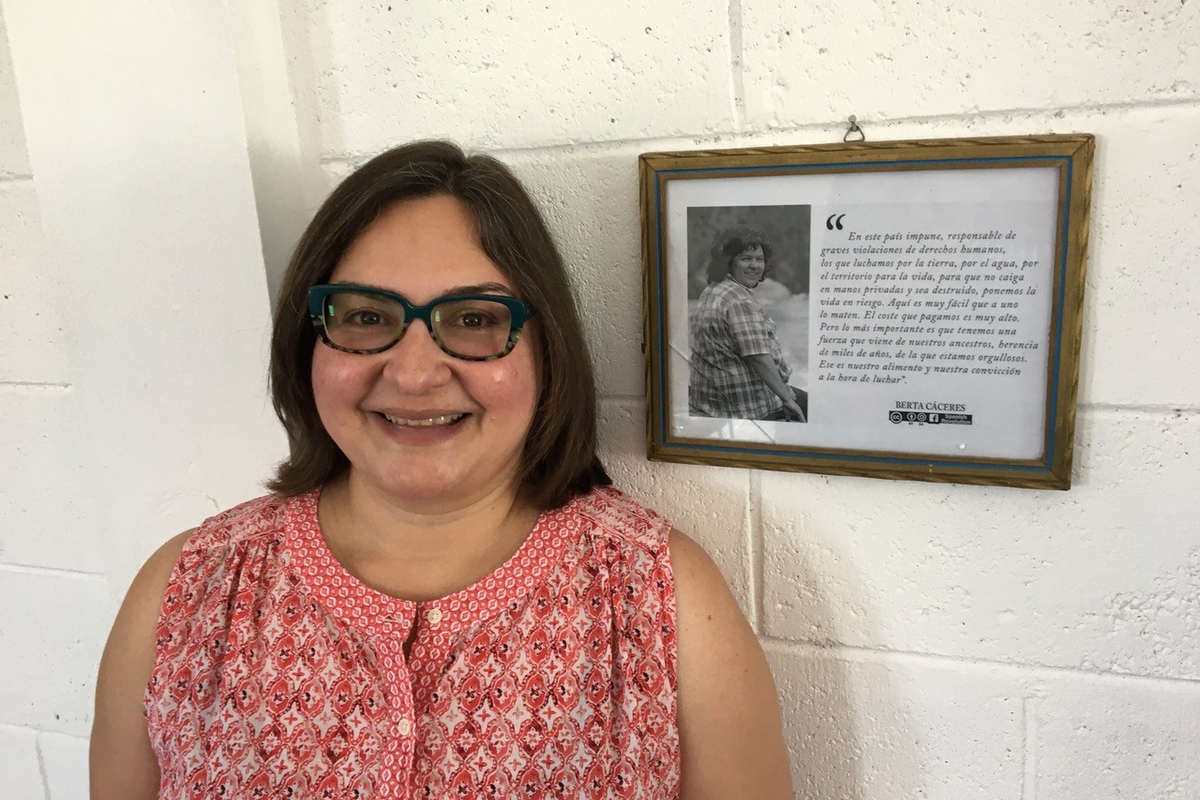 Susana Martínez directed DePaul's Peace, Justice and Conflict Studies Program for three years. Here she is shown during 2019's student orientation. (Courtesy Susana Martínez)
Susana Martínez directed DePaul's Peace, Justice and Conflict Studies Program for three years. Here she is shown during 2019's student orientation. (Courtesy Susana Martínez)
DePaul's mission statement reads: "Through education and research, the university addresses the great questions of our day, promoting peaceful, just and equitable solutions to social and environmental challenges."
As a Latina professor who studies issues surrounding immigration, Susana S. Martínez contributes to this mission in several significant ways.
Martínez credits being a child of immigrants as the driving force that put her on a path to her current role as an associate professor across several departments in the College of Liberal Arts and Social Sciences.
"My father is from Mexico, and my mother is Guatemalan. They left their home countries very young and settled in Los Angeles, where I was born and raised," she says. "Their priority was to give their children everything they didn't have back home, which included access to education."
As an undergraduate student at UCLA, Martínez took a Spanish class after encouragement from friends. This course led Martínez to explore her heritage and to study in Spain, an experience that she cites as her first opportunity to leave home and travel the world. Her newfound freedom led her to pursue her Ph.D. at Yale University across the country from her California home.
Martínez has served DePaul for 22 years as a professor of Spanish in the Department of Modern Languages, three years directing the Peace, Justice and Conflict Studies Program, and one term on the Grace School of Applied Diplomacy's advisory board. All the while, she has looked for opportunities to expand and update her knowledge of Latin American culture.
The bulk of her coursework and research focuses on foreign affairs, such as unaccompanied child migrants crossing Mexican and U.S. borders. In 2014, Martínez traveled to Honduras as part of a human rights delegation sponsored by the Honduras Solidarity Network: Witness for Peace Southwest, U.S.-El Salvador Sister Cities and School of the Americas Watch.
"It opened the door for me to get hands-on experience after researching Central America for years," she says.
The experience left Martínez with a broader perspective toward global affairs and what can be done to mend social justice issues. Mission and Ministry winter-break service immersion trips to Colombia in 2016 and El Salvador in 2019 helped deepen her understanding of the power of nonviolence, community and social justice.
 Martínez stands before a framed photo of Berta Cáceres in 2019, five years after meeting her in Honduras as part of a human rights delegation. Cáceres was assassinated in 2016. (Courtesy Susana Martínez)
Martínez stands before a framed photo of Berta Cáceres in 2019, five years after meeting her in Honduras as part of a human rights delegation. Cáceres was assassinated in 2016. (Courtesy Susana Martínez)
In her classes, Martínez brings together these experiences in Latin America and her interest in the interdisciplinary field of Peace, Justice and Conflict Studies. Along with well-known works of literature, she introduces testimonies — firsthand, real-life narratives that are a call to action.
"Working at DePaul, I'm always learning," she says. "Being with students, I get to learn alongside them and ask really hard questions."
Martínez frequently assigns documentaries such as Which Way Home, a film that follows the stories of Central American children crossing Mexico to get to the United States.
"I try to expose my students to films that we don't know about here," she says. "They're no blockbusters, but they'll bust your heart open and teach you so much."
Martínez ties her work to Vincentian values by encouraging students to connect to one another through dialogues; in the same way, she seeks out collaborations with faculty in other departments.
Partnering with the Women's Center, the Center for Black Diaspora and the Center for Community Health Equity, the Peace, Justice and Conflict Program created the Healing Justice Dialogue Series at the start of COVID-19 to increase students' understanding and consciousness of structural racism and violence. Martínez contributed to this initiative by coordinating with her colleagues to invite speakers, such as restorative justice advocate Fania Davis and former white supremacist Christian Piccolini, to lead discussions. She also coordinated with instructors and alumni to host a conversation about restorative justice in higher education.
"Part of the mission that has spoken to me is knowing that I'm not alone and part of a community," she says.
In the weeks leading up to DePaul's Hispanic Heritage Month celebrations in October, Martínez served as a driving force behind event programming. She collaborated with guest speaker, poet laureate and peacemaker Luis Rodriguez, as well as with co-sponsors during the month-long holiday.
Martínez's impact on DePaul as well as on communities abroad are the exceptional results of one's efforts to recognize the struggles and experiences of others.
To read more about Martínez's experiences in Honduras, read her op-ed in the online publication
Latino Rebels.
Melania Toczko is a senior at DePaul, majoring in communication and media. She works in the Division of Mission and Ministry.